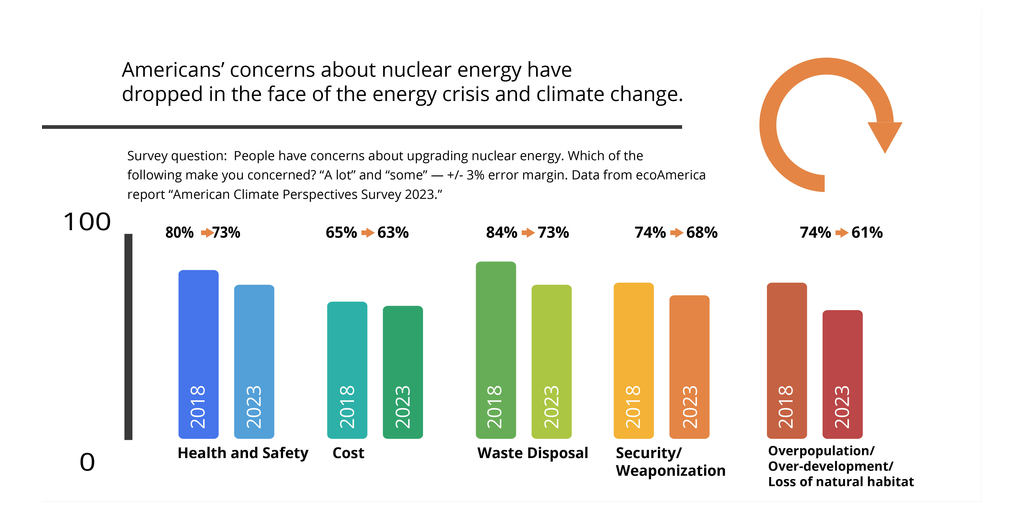
Support for Nuclear Energy Stronger Than Ever in the U.S. and Growing Around the World
More People See Nuclear Energy as Vital to Solving Climate Disruption
WASHINGTON–(BUSINESS WIRE)–#COP28–The majority of U.S. respondents believe nuclear energy is a big part of the solution to climate disruption, according to the sixth consecutive ecoAmerica Climate Perspectives Survey. The annual survey polls preferences and opinions of diverse individuals of various backgrounds and political affiliations about current and future energy choices and their impact on our lives and environment. The full ecoAmerica report can be found here.
Support for research and development in wind, solar, and next-generation nuclear technologies signals that people in the U.S. favor moving to a cleaner energy future. The results also indicate a notable decline in concerns related to nuclear energy. As the country navigates its energy future, this new research by ecoAmerica emphasizes the importance of continued education and awareness around renewable energy and climate change.
The U.S. is pro-nuclear, and respondents want more investment in nuclear
When asked about energy choices to address climate disruption, most respondents support nuclear power because it reliably generates a lot of our electricity (71 percent), helps grow our economy while reducing pollution to our climate and health (71 percent), and keeps the U.S. competitive and energy independent (69 percent). They also want nuclear power plants to be kept running until lower-cost renewable energy becomes available (69 percent), are in favor of nuclear because it does not emit pollutants that harm our health or climate compared to alternatives (68 percent), and thousands of years of uranium and thorium are available to power nuclear plants for sustainable energy (60 percent).
People in the U.S. across all age cohorts and political affiliations want more investment into improved nuclear designs, such as advanced molten salt reactors (MSRs). Support for nuclear research and development has risen, with 73 percent of the population now wanting more focus on developing nuclear energy technologies such as MSRs.
Concerns about nuclear continue to decline
ecoAmerica’s polling was on traditional mainstream criticisms of nuclear power that have dominated popular debates for many decades. It did not include scientists and nuclear experts whose opinions may vary from popular opinion.
Across the six years of the survey, concerns about nuclear energy have dropped in the U.S.
- Concerns about waste disposal dropped (currently 73%, down from 84% in 2018) and concerns about health and safety also declined to 73%, slowly trending toward the scientific and technical evidence.
- Concerns about nuclear power use related to security and weaponization are down to 68%.
- 61% of people surveyed (down from 74% in 2018) are still worried about nuclear power use causing overpopulation or over development, which might reduce critical natural habitat.
Support for nuclear grows around the world
For the first time in six years, ecoAmerica polled respondents in Ontario, Canada, where 58% of electricity production comes from nuclear energy, and Japan, which plans to maximize nuclear energy generation.
In Ontario, respondents want more research and development in next-generation nuclear energy (64 percent); support traditional nuclear power plants (63 percent); want existing nuclear power plants to be kept running as long as they are cost-effective (72 percent); say nuclear power plants keep Ontario competitive and energy independent (76 percent); want nuclear because it does not emit pollutants that harm our health and climate compared to other alternatives (73 percent); and say nuclear power plants reliably generate a lot of electricity (77 percent). In Japan, where 72 percent of respondents are very concerned or somewhat concerned about climate change, nuclear power plants are favored because they reliably generate a lot of energy (55 percent).
“We are already facing the consequences of a changing climate, geopolitical pressure on the fuel supply, and rising prices. At the same time, hundreds of millions of people worldwide do not have access to electricity. It is imprudent to ignore the role of nuclear technology as part of the solutions we already know how to use and deploy,” said Frank Hiroshi Ling, Ph.D., chief scientist, Anthropocene Institute. “Populations and leaders are turning toward nuclear energy because it has an excellent track record and can provide dispatchability. Countries like France have long recognized that nuclear power is a carbon-free baseload energy source that provides supply stability — it is vital to solving climate disruption.”
About Anthropocene Institute
Anthropocene Institute comprises scientists, engineers, communicators, marketers, thought leaders, and advocates — all pulling together toward a common goal: make the Earth abundant for all and sustainable for decades to come. For more information, visit www.anthropoceneinstitute.com.
https://twitter.com/anthrop_inst
https://www.linkedin.com/company/anthinst/
https://www.facebook.com/AnthropoceneInstitute
Contacts
Media Relations Contact:
Marie Domingo
marie@mariedomingo.com
(650) 888-5642




